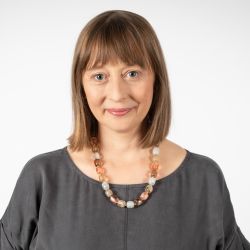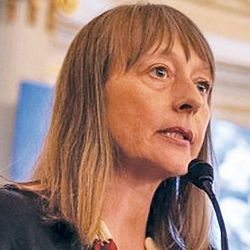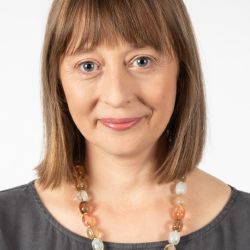In an interview marking Poland's Constitution Day (May 3), Ambassador Aleksandra Piątkowska discusses the stalled free-trade deal between the European Union and Mercosur blocs, Russia’s invasion of Ukraine and its implications for her nation and bilateral relations in light of political changes in both Argentina and Poland.
In the EU, including in Poland, there has been a rising wave of farmer protests, highlighting deep dissatisfaction with the bloc’s agricultural policies. This includes criticism of the proposed EU-Mercosur trade deal. What are the Polish farmers’ and the Polish government’s stances on the deal? Is there a possibility of parliament attempting to block the deal?
First of all, what is very important to understand is that the EU and Mercosur are still engaged in talks and negotiations. We are still not in the moment that we will take any action on bringing it to our national parliament … the talks are still ongoing. I think that the agreement will benefit both sides. It's a win-win agreement. Of course, there are plenty of things to discuss yet, but I think it is a very good moment to reassure everybody that the agreement will serve all countries …
There are some reservations about its provisions because of our very strong agri-food sector. And it is true that Polish farmers are afraid of large amounts of cheaper food entering Poland. Nevertheless, I'm sure that there are provisions that we have to read very carefully and clarify and analyse what more can be done to ensure that our farmers will agree to the agreement.
Personally, I think that the agreement between the EU and Mercosur will expand opportunities for Polish companies to be present in Argentina. Our presence is not very strong here. That's why I think that all the provisions about trade, about taxes, about quotas will also serve Polish companies to enter such important markets like Argentina and Brazil, and of course, Uruguay as well …
I think the agreement is important [in terms of] values and political agreement, because there are plenty of important things that are already stated there; about cooperation, about peace, about political ties, etc. And they are equally important as the economy … I think that, as a whole, it [the deal] is very important for future cooperation between the European Union and Mercosur.
Poland does not have a big economic presence in Argentina, and even though Argentina is Poland’s third-largest partner in South America, there has been a growing negative trade balance in recent years. Poland primarily exports machinery and transportation products, while importing foodstuffs and vegetable products. What are the barriers to improved trade? What efforts are being made to deepen ties?
Unfortunately, this negative trade balance between Argentina and Poland has persisted for some time. As an Embassy, Poland would like to level this disproportion, which is really significant. We need some kind of diversification and balancing of mutual trade. And if we are talking about the area of agriculture, the agrifood industry, 80 percent of exports of Argentina to Poland are soybean oil cakes used as a component of animal feed. We can and we should diversify it.
Poland has also a lot to offer to Argentina. We are the largest producer of apples and pumpkins in the European Union and we have plenty of other products, things to offer. We are the second-largest producer of lithium-ion batteries after China. We have, of course, green technology to offer to Argentina because both Argentina and Poland are countries that need [to] search for new energy [sources].
I think that to increase the export of agri-food products from Poland to Argentina, we have to complete the work to approve veterinary certificates. This is the work that we have to do between [Argentina’s food health agency] SENASA and our GIW, Główny Instytut Weteranaryjny [“Central Veterinary Institute”]. I think this improvement of the veterinary certificates in various products; milk, poultry, dairy products, etc., is something that will help us to deal with this barrier and to sell Polish products here, and Argentine [products] in Poland.
A good example [of an effort to deepen ties], on which we should concentrate … is signing a double taxation treaty. This is what we are missing with Argentina. I am sure it could help companies from both countries to invest. Of course, Poland has a free=market economy, we have stable rules, we are a transparent country, so we are really eager to cooperate in Argentina, with Argentina, [and I am] not only talking about trade, but also about investment.
At the end of 2023, both Poland and Argentina experienced major political changes; in Poland, parliamentary elections, in Argentina, change of presidency. What shifts can be expected regarding bilateral relations between the countries?
Well, I am a diplomat, so I think that the most important thing between countries is cooperation. We are not talking about governments. We are talking about people and just country-to-country cooperation. But, as a matter of fact, changes of government in both countries, for me, didn't really result in significant changes in the priorities of Polish foreign policy. I think that regardless of which government is currently in power, the relations are good because we don't have any historical problems between our countries. We have the Polish diaspora here, a very good and hard-working one. So I don't see much change in the Polish policy towards Argentina and vice versa …
Poland, like many countries, is willing to cooperate with every government that respects the principles of the Charter of the United Nations, that respects international law, and that complies with international law. We were ready to cooperate with previous governments; we will be ready to cooperate with the government of Javier Milei …
I think that what we are still missing between Argentina and Poland, a pending issue, is a visit at the highest level. I think that with the previous government, over the last five years when I was here, unfortunately, it didn't work out for many reasons. I don’t blame anybody, I am just saying that it did not work out for many reasons. I think that this kind of visit – of the president of Poland to Argentina or [the president] Argentina to Poland – will provide some kind of impetus to strengthen relations, to show to the Polish companies that we can be present here or to Argentine [companies] that Poland is a country which is worth taking into account as a business setting.
Have you had a chance to meet with President Javier Millei or with Foreign Minister Diana Mondino?
Well, I met with President Millei during the [inauguration] ceremony of December 10 last year, but it was just three or four minutes of conversation … I said that we should really work on this high-level visit to Poland – him to Poland, or the President of Poland to Argentina.
I asked for [a meeting with] Diana Mondino, Minister of Foreign Affairs and we had a 40-minute discussion summing up where our countries are in both the political, economic, and cultural perspectives and what has been done, and what we should do in the future. So I mentioned economic issues – I mentioned the double taxation agreement, we were talking about political consultation that we should have every two years and it's a very good instrument for foreign diplomacy to have the meeting of the deputy-ministers, during which we talk in depth about relations.
With every new government you have to just approach and start to present yourself, to present Poland and check what was done and what should be done in the future.
“We welcome this change, this shift in the foreign policy of Argentina.”
Milei has shifted Argentina’s foreign policy towards the United States and Israel, the West, “a coalition of the free world.” His position has included strong vocal support for Ukraine and condemnation of the Russian invasion. How has Poland welcomed this shift? How key is support like this from Milei?
Yes, you’re right. Since the beginning of his mandate, Milei took a very clear position on the Russian full-scale invasion of Ukraine and this position is absolutely identical to that of Poland. So condemnation of invasion, assistance to Ukraine, and support for the country in the international forums, in international organisation… in this aspect, we are very like-minded countries and we welcome this change, this shift in the foreign policy of Argentina. We welcome this position and I think it is important to have a coalition of democratic countries that will sustain the growing pressure on Russia. The pressure will be much bigger, much more substantial. We know that Argentina plays a very important role in the region. That is why it's good to have its support and this common position on the war, which Russia started two years ago.
How does Poland, being part of NATO’s eastern flank, perceive its role in ensuring regional security, especially in light of its support for Ukraine?
I think all our NATO allies know that we play a very important role in securing this border, Europe knows it, of course, our alliance in other parts of the Atlantic, and everybody knows that we share the border with Russia, Belarus, and Ukraine. And yet, there are many indicators that we may be the country that will suffer a military attack from Russia. We are still thinking about it and the government of Poland is taking steps to prepare the country, the citizens, for possible attack.
The most important measure that the government of Poland recently is undertaking is a significant increase in the budget for defence spending. Data shows that we spend 3.1 percent of GDP on armaments. This is the second [highest] position, I guess, among the NATO countries, something [showing] that we are taking the threat of Russia very seriously and I think everybody is aware of it.
In recent days, President Andrzej Duda has proposed stationing nuclear weapons in Poland...
Well, we already have the United States military troops in Poland. There are some negotiations between Poland and Germany to have their soldiers with, of course, top military equipment. So I think that every idea which will serve to protect us, and to protect all of NATO… Because it could start with Poland, it could start with three Baltic states. Nevertheless, we know very well that we are the first or among the first countries that could be invaded or be provoked to react.
How likely do you think the escalation of conflict on NATO territory is?
I am afraid that it’s quite possible, quite likely. As a diplomat, I believe in negotiation, I believe in peace. I believe that we have to, of course, talk about peace, but our government, Radosław Sikorski, the Minister of Foreign Affairs, has stated very clearly [that] there is no negotiation with the aggressor. Russia has to withdraw all its troops from Ukraine and then we can talk about how to repay Ukraine [for] all the devastation that took place in [its] territory. We will not negotiate with Russia and I think that [neither will] Ukraine. President [Volodymyr] Zelenskyy stated very openly that there is no negotiation. I just believe in a way that we have to prepare ourselves for a possible attack. In the European Union, at NATO, we have to [convince] our alliance, our partners, that this is possible. For many, many years, Poland was the first to talk about Russia. We were afraid of Russia and we had our historical experiences which are very important. Many of our colleagues used to say that we are really a little bit crazy, a bit Russo-phobic, something like that. But it turns out that we were right. We were just cautious. Our experience was that bad.
Ukraine, which was part of the Soviet Union many years ago, now it's the first country that suffers from the neo-imperialist politics of Russia and we have to do everything that is possible to help our Ukrainian friends.
"We have to do everything that is possible to help our Ukrainian friends."
How would you address the prevalence of pro-Russian narratives and the significant amount of disinformation in the media – including in Argentina – regarding NATO?
Well, we did our part as the Embassy, because this was our project to have the International Conference on Disinformation on April 19 here, in the city, inviting international experts from the United States, the United Kingdom, Poland, and Ukraine, and many others to discuss the issue of disinformation [that includes] not only fake news but also disinformation that organisations, groups, or individual people spread in the Internet sharing lies or information about situations that never happened. Some people say that [the Russo-Ukrainian war] is a war of the United States. It is not the war of the United States – Russia is the aggressor. Some people tell me that it’s a Ukrainian war – it is not the Ukrainian war, it is the Russian war in Ukraine. So I think that there is plenty of this information disseminated on the Internet and social media, and unfortunately we are not strong enough as individuals to fight disinformation alone. Our government has to stand on that and introduce a law – like the European Union did – that fights and labels disinformation. Fighting it will not be easy, of course, because it's not easy to explain to everybody that something was not true or somebody was telling the lies, but we have to do it because it is not only the war on the ground, it is also the war in the virtual, Internet space. And this is equally dangerous as the normal war.
According to Argentina’s last national census, the Polish diaspora ranks as the fifth-largest European diaspora in Argentina. This is the only country in the world that celebrates “Día del Colono Polaco,” the Day of the Polish Settler. Tell us about the Polish community and the legacies of Polish heritage in Argentina.
It is really hard to say exactly how many people of Polish origin, or Polish descent, now live in Argentina, but the number is estimated to be between 250,000 to 500,000, so it’s a lot, really!
The history of these Polish immigrants to Argentina dates back to the late 19th century when many Polish people sought better economic opportunities and political stability in Argentina. The first wave of migration, principally farmers, settled in the province of Misiones. During the next one, between the wars, there were many more engineers and workers, rather than farmers. World War II resulted in the third wave of emigration; mainly former soldiers of the Allied forces but also soldiers from the II Corps of the General Władysław Anders’ Army.
Looking at the map of Argentina; plenty of descendants live in Buenos Aires and also in the province of Buenos Aires, but also Misiones, Tucumán, Córdoba, and Comodoro Rivadavia, so we are in all parts of Argentina, really.
What I think is important and I'm always underlining that Polish people have participated in the building of Argentina, and have been present in developing Argentina with our work, with dedication because Argentina opened its arms to take all these immigrants. The legacies can be seen in every corner in Buenos Aires, but also in many other places in Argentina.
Yerba Mate Amanda, which is a very famous product in Argentina, was established by Juan [Jan] Szychowski, a Polish migrant to Misiones. It is produced by Polish descendants. We have Polish engineers working in the oil industry in Comodoro Rivadavia. In Buenos Aires, there is a very wonderful Tres de Febrero park, which was partly designed by Czesław Jordan Wysocki. An emerging industry of kayaks; the kayaks as a sport were introduced in Argentina by the Polish man, Ryszard Kruszewski. So I think there are plenty of places connected to Poland, with Polish people and I think that it is important that the Polish diaspora is very vibrant here.
We have plenty of organisations representing their culture, traditions, and Polish ethnic dances. And, of course, Polish food, Polish cuisine. I think we are like Argentines, we like to eat a lot! So every year there is a huge feria with Polish stands with Polish food, pierogi, and cakes, such as makowiec [Polish Poppyseed Roll], and Argentine people love it. It's very Polish. We still have the Polish Church here. Poland is still a pretty conservative Catholic country. It has changed a lot in the last 20 years, but nevertheless, there is still faith. Faith is very important for Polish descendants. There is a Polish church, there is a Polish Catholic Action in Martín Coronado, which is also called Maciaszkowo. There, we have a Polish school. We have very strong teams of Polish scouts here. They are still very proud that they have Polish roots. But they are also Argentines – they understand the country. They love Argentina, of course, and it’s nice when we have these national days here and we listen to the Polish and Argentinian anthems and everybody is singing both of them. That's wonderful, really.
As Poland celebrates Constitution Day on May 3, what is the significance of this celebration and how does it resonate in contemporary diplomatic engagements in Argentina?
The day of the Constitution of the Third of May is always important, for all Polish embassies abroad. There were not many countries that had a Constitution, a very good Constitution in 1791. We are celebrating it in different locations with different tools.
Every Embassy is organising a reception on that day. We are working hard to bring together all the most important people in Argentina that we are working with – representatives of various ministries, parliament, the Congress of Argentina, our collaborators in the fields of culture, education, and economy. On this day, we would like to thank them and appreciate our cooperation with them.
We and the Polish diaspora are organising concerts, exhibitions, interviews, and receptions. We are celebrating this day all over Argentina. We are trying to bring our Argentinian friends closer by serving Polish food and, of course, Polish vodka! And I am trying to be in as many places as possible, as well. This year, I will be in three different places in Argentina to celebrate this day. We're always thinking about who the target audience is, and to whom we are talking about our national day, so we are trying to explain why it is so important.
We show the history and the tradition of Poland so that our friends can understand what Poland is and how we can work together in the future.



























Comments